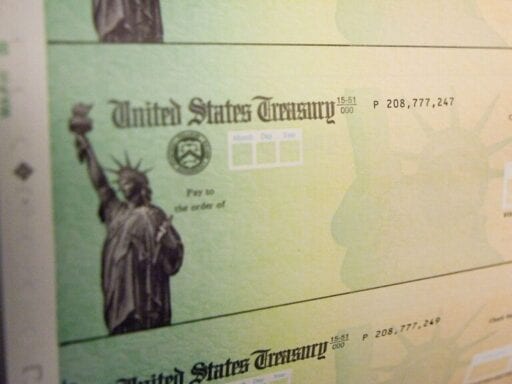Congress is still debating how to deliver them.
After a week of Congress members and the Trump administration proposing various plans to get cash into the hands of Americans to help them weather the coronavirus crisis, Senate Republicans appear to have landed on a plan. While details are still being negotiated, it appears likely that what changes to the cash measures will be made will change how the cash is delivered, not how much and to whom.
The Coronavirus Aid, Relief, and Economic Security (CARES) Act, or the “phase three” coronavirus bill, includes, as of now, cash measures totaling $301 billion per the conservative Tax Foundation, the only think tank that has modeled the exact proposal as of this writing.
The plan’s provisions are very simple. Adults would get $1,200 each and children $500 each. At higher incomes, the checks would get smaller: The benefit would start decreasing at a rate of $5 for every additional $100 in income. The phaseout starts at $75,000 in adjusted gross income for singles, $112,500 for heads of household, and $150,000 for married couples filing jointly; it would phase out entirely by $99,000 for singles and $198,000 for couples (with no children).
For example, a single childless person with an AGI of $85,000 would get $700 because $500 of the benefit was phased out by their higher income.
Unlike some early Senate Republican proposals, there is no minimum income (which would’ve excluded very poor people), and the check amounts don’t “phase in,” so the middle class doesn’t get more than the poor.
Here is how that policy looks in graph form:
/cdn.vox-cdn.com/uploads/chorus_asset/file/19825993/taxfoundation_caresact_stimulus.png) Tax Foundation
Tax FoundationThe check is a one-off. While Senate Democrats like Michael Bennet (CO), Cory Booker (NJ), and Sherrod Brown (OH) called for additional checks to be triggered by changes in the unemployment rate, and left-leaning members of Congress like Sen. Bernie Sanders (I-VT) and Reps. Maxine Waters (D-CA), Ilhan Omar (D-MN) and Rashida Tlaib (D-MI) called for monthly payments, the Senate bill’s cash portion won’t re-up unless Congress explicitly authorizes additional cash assistance. Treasury Secretary Steve Mnuchin had signaled he wanted two installments but faced pushback from some Senate Republicans like Lindsey Graham (SC).
The Tax Foundation estimates that 93.6 percent of tax filers will get a check. Using a conventional measure (that is excluding “dynamic” effects), they find that the poorest fifth of Americans will see their income grow by 16.33 percent due to the bill, while the top 1 percent won’t see their incomes grow at all. One hundred percent of the poorest Americans would be eligible for a rebate, a huge change from the earlier Senate GOP proposal where as little as 80 percent of poor households were eligible.
/cdn.vox-cdn.com/uploads/chorus_asset/file/19826071/Screenshot_2020_03_23_11.36.29.png) Tax Foundation
Tax FoundationThe phase-out for top earners will be done using 2019 tax returns, or 2018 returns if the taxpayer in question hasn’t filed their 2019 taxes yet. The bill says that taxpayers relying on Social Security as part of retirement or through the Social Security Disability Insurance program can have their Social Security Administration data used directly; beneficiaries of Supplemental Security Income, which often benefits old or disabled people in poverty, are not included in the current version.
But it’s important to note that a large minority of Americans don’t file taxes. The Tax Policy Center estimates that in 2019, about 43.8 percent of American “tax units” owed zero or negative income taxes. Most of those Americans will still file taxes to get refundable credits like the Earned Income Tax Credit or to retrieve taxes withheld by their employer that they don’t actually owe. But millions of Americans — 12 percent is a decent estimate — will not file taxes, either because there’s no reason to or because they’re among the millions eligible for the EITC who don’t receive it.
The Senate bill as written would require these people to file 2019 returns to get their coronavirus checks. That’s a potentially significant burden, especially at a time when the IRS’s volunteer tax prep centers for low-income people are largely shut down due to social distancing (I should know — I’ve been volunteering this tax season and haven’t gone in since March 14).
Senate Democrats have included among their demands a request that the bill be amended to allow cash to go more directly to these people. Some of them are addressed by the Social Security language already in the Senate GOP bill, but more could be included by allowing the benefits to be sent through EBT cards to people benefiting from welfare or food stamps, or by allowing it to be added the Supplemental Security Income checks for elderly or disabled poor people, or by allowing states to send the rebates to households whose information they have on file. The Center on Budget and Policy Priorities’ Robert Greenstein lays out some options here.
Sign up for the Future Perfect newsletter and we’ll send you a roundup of ideas and solutions for tackling the world’s biggest challenges — and how to get better at doing good.
Future Perfect is funded in part by individual contributions, grants, and sponsorships. Learn more here.
Author: Dylan Matthews
Read More



